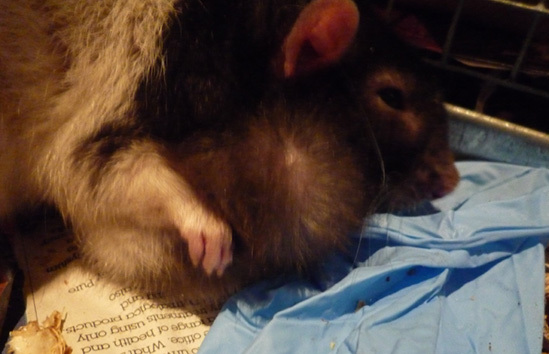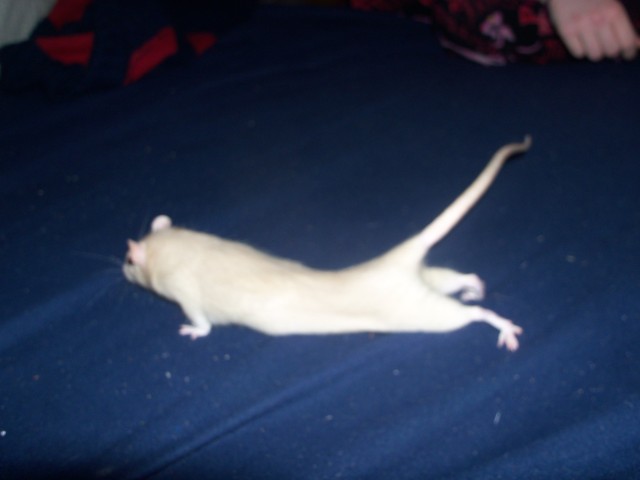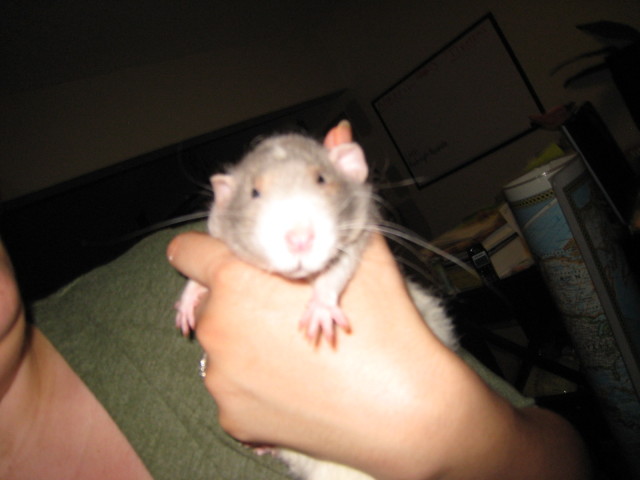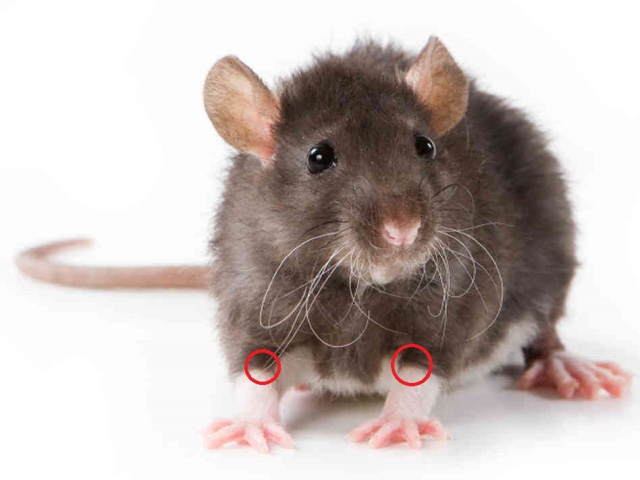QuestionHi, I was reading a question someone asked you in October 2008 to do with a rex rat that began to loose weight despite eating regularly and having no change in diet or appetite as well as minor fur loss in patches. There was also a mention of an orange colour on the skin which you asked for more information on (pictures, was it a residue etc.)
I am having the same problem with one of my rats in particular. I own 5 males, all intact with 4 in one cage and 1 on his own (grumpy boy.) The 4 in a cage together consist of 3 from the same litter, around a year old now prob less which I adopted together and introduced to an existing male (maybe 4-6months older)who was by himself and miserable after being removed from his companion due to his companions intense dislike of any other rats.
I started to notice a few bald spots on one of the boys Ashes) and a thinning of the hair in the others and upon investigation could see an orange tint to the skin which appears to be residue-like rather than an actual change to the skins colour.
I was suspecting some form of mite as I had once had a colony of dwarf mice when I was younger (bought from a rather bad source) which were all riddled with tiny mites that appeared only if you disturbed the fur and then would swarm to the surface rather alarmingly (they all died inside a week despite attempts at treatment.)
So,I bathed all the rats with shampoo to get rid of mites and sure enough once wet you could rub/pick the orange away with persistence and what looked like dead mites appeared to be in coat after. I checked the bedding and could see them in places moving around like little tiny orange crabs; so I completely removed everything, changed the bedding and disinfected . I then used a spot-on treatment against fleas, mites and parasites bought in a local pet store on all the rats. This seemed to have no effect and where as the regular bathing got rid of some of the orange-ness the quality of their coats did not improve and they were looking thinner. I kept up with the store bought spot-on for a few weeks(maybe 4) and then went to my vets, explained the problem an was reluctantly (after relentlessly badgering on about it)given a stronger type of spot-on that I forget the name of now. The vet was dismissive of my claims to have seen orange coloured mites and insisted mites were not visible to the human eye.
Anyway I was to put a drop on the backs of their necks and then after a 2 week interval repeat. I did this and they seemed better, the bald patches on Ashes cleared up and the others conditions improved; however now 2 months later Ashes has dropped in weight and his coat condition is still not back to normal. I am worried as I can see his shoulder blades easily and his fat layer has depleted leaving him very skinny. He was never a fatty, nor was he a runt, more athletic in build very similar to his cage mate Renee; but now the difference in their sizes is very noticeable and he feels frail in my hands.
He is OK in his health generally, still inquisitive & eating normally though not fussed about treats the others snap up. I am very worried about his weight loss and am ressisting going to the vet again as I have become unemployed and fear the vet will just tell me to feed him more(like I havn't tried) take my money and dismiss my reports of tiny orange mites etc again.
I'm sure this is parasitic in nature but am completely out of ideas.
Do you have any idea what this could be?
Can you recommend something to bulk him up as he is painfully thin and I'm scared he will die soon if he does not put some weight on.
A friends cat has had kittens and she has some surplus kitten weaning stuff she had to feed a 2 week old kitten that had lost weight using a syringe teat thing into its tummy; do you think it would help him to have some of this to gain some weight?
AnswerHi there
For starters, your vet is wrong (I almost cringe when I hear myself say that, but I have come to find over the past several years that even though there is a certificate on the wall, this doesn't mean they are smarter than you nor I nor does it mean we (the layperson) cannot possibly know what they know about veterinary issues unless we have a degree that says so. Totally untrue. What is also untrue is that you cannot see mites unless your magnifying them 1000 times. There are many many types of parasites that our rats can get, some need magnification to see, others are easily seen, these being lice (wingless, silver-ish and oblong in length for the most part) and tropical rat mites, which can be pretty large when engorged with blood. These are easily seen with the naked eye, this I promise you. You are NOT wrong. The vet is. ::sighs with relief that it is finally said!::
What the vet probably used was ivermectin or selemectin which, when applied between the shoulder blades, absorbs into the skin and when the parasites feed on the rat, they also are poisoned by the anti-parasite application that was used and they die. This is the best and safest way to destroy mites and lice. As you have found, the over the counter products waste time and money. Some are even unsafe for animals and here in the US there are lawsuits left and right with a popular name brand that has been accused of causing serious health problems with its use, causing death in dogs and cats alike. I steer clear of any over the counter product like this and also suggest the same for my readers. Sprays are also not real good to use around the rats anyhow due to their very delicate lungs. If the vet supplies the sprays and has you first apply it to your hands (while you have on gloves) and rub on the rats fur and spray their cage with first removing the rats, thats not so bad, but still, there is no use for that when you can use the topical medication with better results.
So thats that.....your right, you more than likely have seen the mites, esp when you disturb them in the fur and they all scatter. This is typical of rat mites. I loathe them!! I used to love to splat the little suckers with my thumb each time one of them would try to out run me! LOL
Now, about the weight loss (and this may not be the best of news) usually with weight loss, it also means there is an underlying cause. It could be from kidney problems, liver problems or even heart problems. First of all, we usually look at their eating habits. Do you leave food down at all times (self feeders) or do you feed them on a schedule? We usually recommend self feeding the hard foods such as pellets etc (you may already be aware of the fact I do not suggest feeding store bought seed mixes as they are far from providing the proper nutrition they need for over all health) and if you feed them along with the hard food, veggies etc...at different times, its important to know if he gets as much as the others get as far as food goes. I am sure you already addressed this but I had to ask just in case.
With kidney disease, there are not alot of outward signs of illness other than weight loss at first, but as the disease accelerates, they seem to drink more water than usual and urinate less. Loose stools are also common and later, loss of appetite.
Thus far, we are only seeing weight loss. This is when having a vet that is well versed in rat care and well versed in common rat disease is important. An exam of the rat would be necessary to rule out kidney disease The vet should palpate the kidneys and should take note the shape of the kidney and also if it feels unusually hard. The abnormal shape of the kidneys would indicate scarring. If the rat does have it, this does not mean his life is over. Of course, there are treatments for kidney disease, ranging from using lasix to rid the body of excess fluids not being filtered by the kidneys and also a change in diet and a few other things, but we are not even there yet, unsure what is going on with him, so I wont continue on and on about treatment, etc...
Heart disease also starts by unexplained weight loss. However, he isnt showing any other signs of it so its either too early in the game for it OR he doesnt have it.
I can keep going on and on, giving educated guesses about what it may be since weight loss is a sign of many things, esp gradual weight loss.
First, let me know about his eating habits, what he eats and how often , and also about your ways of feeding.
I can tell you to give him this or that (which I will before I am done, I promise) but if he has an underlying problem, he may not gain any weight or may gain it but it will only be temporary. It could simply be from the fact they other rats hog the food before he gets there,which is why I asked about feeding habits.
Please let me know about the few things I asked above and we can try to figure this out. Hang in there.

 Do you have any advise for a mouse?
Question
Miss Honey Bun
I know mice and rats are two se
Do you have any advise for a mouse?
Question
Miss Honey Bun
I know mice and rats are two se
 male rat large rapidly growing tumour
Questionhannibal2
QUESTION: better photo is atta
male rat large rapidly growing tumour
Questionhannibal2
QUESTION: better photo is atta
 I worry that my pet rat has fallen ill.
Question
Lucy
My pet rat Lucy is about 9 months old, fe
I worry that my pet rat has fallen ill.
Question
Lucy
My pet rat Lucy is about 9 months old, fe
 Testing Costs at the vet for C.H.F....
Question
My Sweet Flex
I live in Stockton, CA and I was
Testing Costs at the vet for C.H.F....
Question
My Sweet Flex
I live in Stockton, CA and I was
 My Rat keeps biting her arms
QuestionQUESTION: Hey there, I have 2 pet Rats. Recentl
My Rat keeps biting her arms
QuestionQUESTION: Hey there, I have 2 pet Rats. Recentl